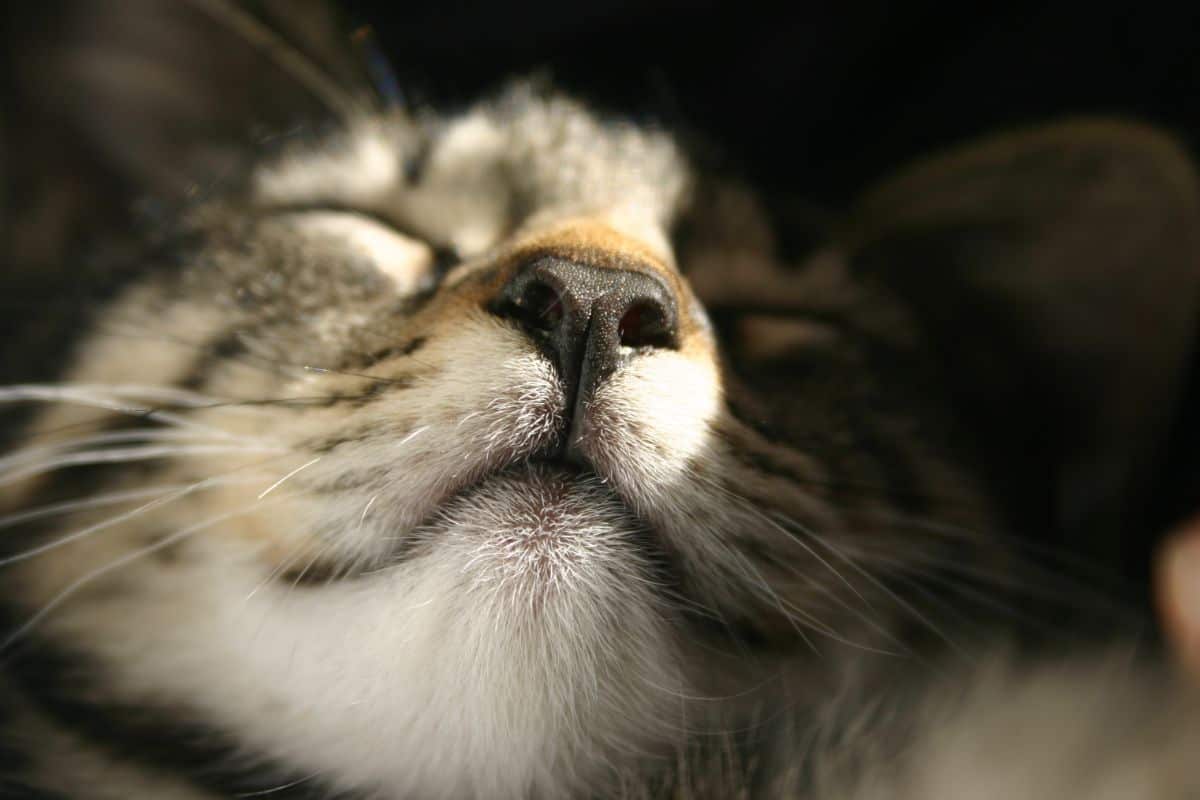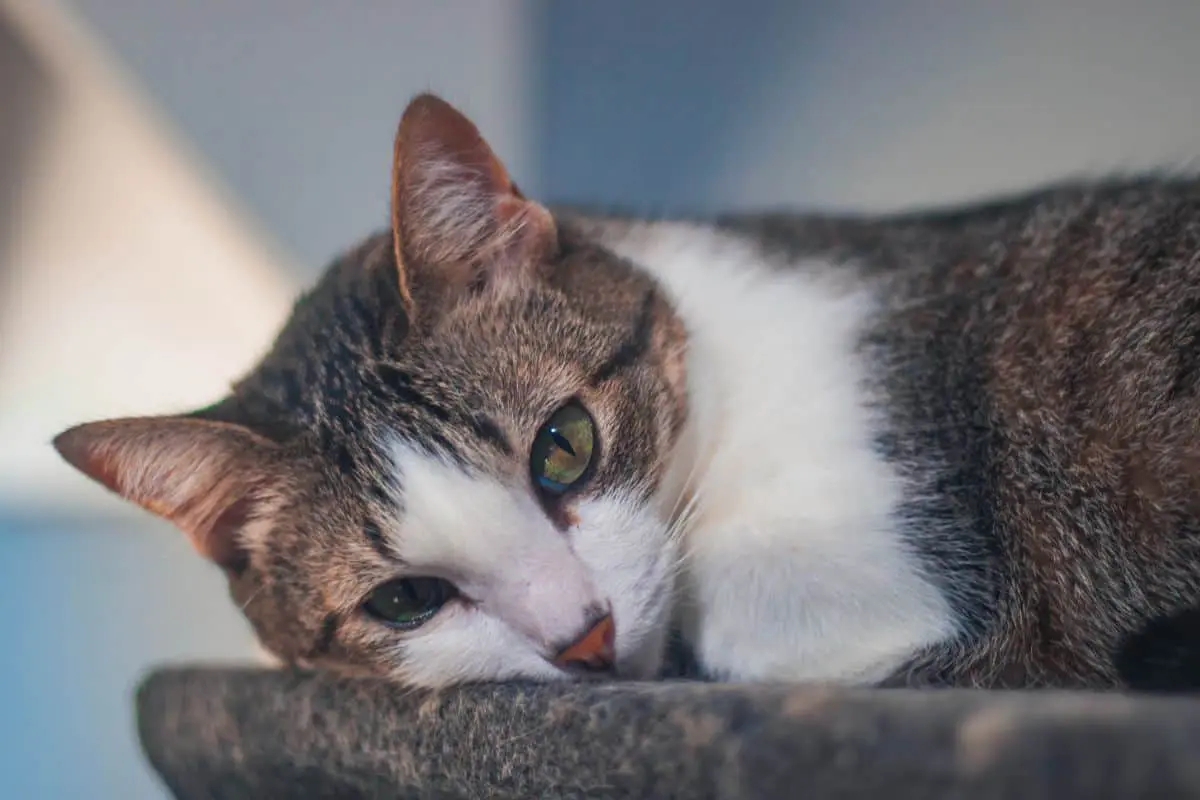Last Updated: 11 months ago
As the owner of your cat, it’s only natural that you should feel concerned about changes to their face – especially if you’re not sure what those changes are, or even what they might mean.
From the crust in their eyes to strange discharge coming from their noses – as an owner, it’s understandable why you might feel concerned.

Is it a health issue, or nothing to worry about at all?
If you’re currently asking yourself this question, you have come to the right place.
In this article, we are going to be taking a closer look at what it might mean if you are currently noticing that black stuff is coming from your cat’s nose.
Along the way, we’ll be detailing the differences between boogers and scabs, to help you understand the differences between the two.
Whenever you’re ready, just keep reading!
What Is The Black Stuff On My Cat’s Nose?
Before we get any further into this guide, we first want to point out that if your cat is displaying any signs of distress, pain or other negative changes to their normal temperament – it is important to immediately take your cat to the veterinarian.
The vet will be able to provide their professional opinion on what they think is the matter, as well as ensure that the proper treatment is given to get your cat comfortable and on the road to recovery.
Moving on, if you’ve simply noticed that there is black discharge coming from your cat’s nose and you’re simply wondering what it might be, more often than not there is no reason to be alarmed or worried.
This is because the black stuff that you see coming from your cat’s nose could be caused by either boogers, nasal mucus or even scabs.
As a side note, keep in mind that little flecks of dried blood are often signs of a bacterial infection such as lentigo.
Needless to say, as the owner of your cat, you’re doing the right thing to want to learn more about what might be causing black stuff to come from their nose.
Even though it can be quite alarming, spotting these little bits of discharge coming from the nose early on can help to indicate the health of your cat, all while ensuring that you will be able to make an informed decision of whether or not they need to see the vet – as we have already touched upon above.
This brings us to our next point.
What Is The Black Stuff Coming From My Cat’s Nose?
Just like we have already briefly touched upon above, black discharge coming from your cat’s nose is often going to be nothing to worry about.
In fact, there are several harmless factors that can contribute to it.
For example, perhaps little pieces of fabric from your cat’s favorite toy have become stuff inside the nose, or maybe they’ve been exploring in the garden and the black specks are merely nothing but dried mud.
After initial inspection, you might find that the black specks coming from your cat’s nose can be easily explained, and in turn nothing to worry about.
Along with this, you might also want to think about whether or not you have any black/dark furniture in your home.
If your cat often plays in your home and likes to explore, then there is a chance that the black stuff you’re seeing in your cat’s nose is nothing more than little bits of fabric from the furniture.
Alternatively, it is also worth mentioning that lint, dust and other particles in the air could be getting stuck in your cat’s nose, which could be mixing with the mucus in your cat’s nose and causing it to appear darker than it actually is.
If you feel that dust or lint might be the problem, then while this isn’t a health concern – we do recommend that you make the time to regularly vacuum the areas of your home that your cat often frequents, as this will help to reduce the chances of the dust/lint getting into your cat’s nose.
What’s The Difference Between Boogers And Scabs?

Along with all of the above, another harmless reason for the black discharge you see coming out of your cat’s noise could simply be down to a healing scab.
Oftentimes, during the healing process of a scab, it is natural for dried blood to be present where the area of the wound is.
There are many ways that cats can accidentally get a little scratch on their nose (or any other part of the body/face, for that matter) and facial scratches are especially common when more than one cat lives in the same household.
With that being said, the black stuff you see coming from your cat’s nose could simply be little bits of dried blood.
As for boogers?
Well, if you’re noticing that the boogers are a little darker than they should be, then dried blood could also be a sign of what the problem is.
However, as boogers have a different consistency to scabs, keep in mind that there is a slight chance that there could be an underlying problem that may require treatment from the vet – such as a bacterial infection.
This brings us to our next point!
Underlying Issues That Could Be Causing Black Stuff On Your Cat’s Nose
As we have already mentioned above, for the most part – black stuff coming from your cat’s nose is typically not going to be a cause for concern.
However, it is important to keep in mind that black stuff coming from your cat’s nose could be pointing to an underlying health issue that will need further medical attention.
Like we have already briefly touched upon above, one of the most common underlying causes of black stuff coming from your cat’s nose is a bacterial infection.
When a bacterial infection occurs, it can sometimes cause the mucous that your cat is making to be somewhat darker in appearance than it usually is.
Even though bacterial infections usually go away after a week or so, these infections can sometimes cause respiratory issues, so it is important to make sure that you are taking your cat to the vet for further inspection and treatment if you feel that this might be the case.
As well as this, another potential cause of the black stuff coming from your cat’s nose could be feline herpes.
While this might sound extremely alarming, the herpes virus in cats is not contagious to humans and cats can often make a full recovery when given the right treatment.
Of course, just like with the bacterial infection, it is important to make sure that you take your cat to the vet’s to get them on the road to recovery.
As a side note here, in the rare instance that feline herpes is the cause for the black stuff coming from your cat’s nose, it is important to note that this infection is contagious to other cats.
For this reason, if you happen to have more than one cat in your household, it is important to make sure that you are keeping them separated from each other until a full recovery has been made.
Generally speaking, though, it is important to note that for the most part, a cat’s nose should be clean and dry.
Even though there are some cats that will have wetter noses than others, the majority of cats tend to have dry noses without any discharge coming from it.
With that being said, if you have recently noticed black discharge coming from your cat’s nose and you’re not sure what it is and you’re feeling concerned – we recommend that you take your cat to the vet so that the veterinarian will be able to provide you with their medical opinion on what they feel the issue could be.
Should I Clean My Cat’s Nose?
Whatever the cause of the black stuff coming from your cat’s nose, it is important that you keep it as clean and dry as you possibly can.
By making sure that you are helping your cat by cleaning their nose, you will help to ensure that your cat is as comfortable as they can be, while also ensuring that they are able to breathe without any restrictions.
Of course, even though it might be necessary to give your cat’s nose a clean from time to time, as we have already mentioned above – if you are noticing unusual discharge that is regularly coming from your cat’s nose or your cat is displaying signs of discomfort along with it – it is very important to make sure that you are taking your cat to the veterinarian for help.
As a side note here, it is very important to remember that cats are very sensitive and solitary creatures, which means that they might not like any prodding around their face area – regardless of how strong the bond you share with your cat is.
With that being said, if you are planning to clean your cat’s nose, it is important that you approach them gently and remain calm throughout the cleaning process.
The last thing that you want to do is cause your cat to become fearful or even agitated.
Along with this, if the black stuff coming from your cat’s nose is caused by dried blood, then you should be extra careful to not scratch or poke the area where the wound is healing, as this could hurt your cat and cause them to be fearful of getting their nose cleaned.
Final Thoughts
All in all, there are many harmless reasons why you might be seeing black stuff coming from your cat’s nose, and oftentimes – there will be nothing for you to be concerned about.
Now that you have taken the time to read through all of the above, we are hoping that you now have a much better idea of what the black stuff that you see might be, as well as a better understanding of the differences between scabs and boogers.
Of course, if you are still stumped on what might be causing the black stuff to come out of your cat’s nose, or you’re even noticing signs that your cat is in pain, uncomfortable or even struggling to breathe properly – it is absolutely imperative that you take your cat to the vet, as they will be able to provide the medical treatment needed to help determine what the problem is and provide the necessary treatment to get your cat back to full health.
Thank you for reading, and we hope that this guide has been helpful to you.
